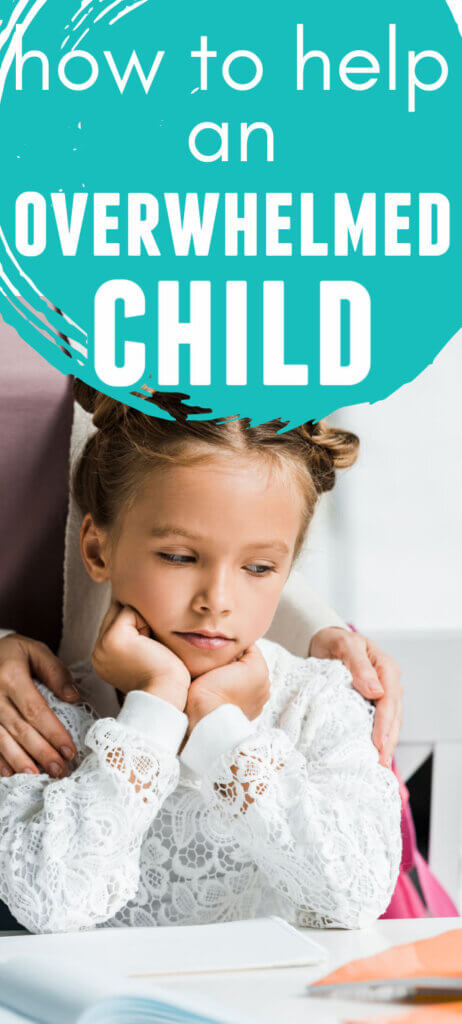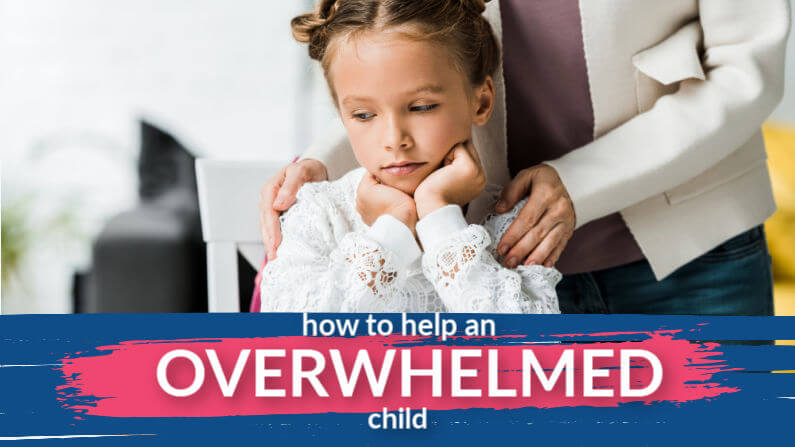Most kids will experience overwhelm at some point in their life. However, if you are working with or parenting a highly sensitive child, a child who has experienced trauma, or a child who has processing type issues, then you are probably asking yourself how to help an overwhelmed child when they have negative behaviors.
If a child gets overwhelmed easily they will have trouble coping with normal activities such as behaving in a classroom, getting ready in the morning, or trying to do school work or learn a new task.
As an adult, watching a child feel overwhelmed and stuck can be difficult. It can cause frustration, anger, confusion, and a constant sense of treading water. You will find yourself wondering, how do you help an overwhelmed child? How do you help them do what they need to do without melting down, retreating, or becoming dysregulated?
This post may contain affiliate links.
How to Know if Your Child is Overwhelmed
The first step in answering the question of how to help an overwhelmed child is learning to recognize their warning signs. All children have behaviors that will point to the fact that they are becoming overwhelmed and stuck. Here are some of the common behaviors that you may notice:
Withdrawn
Some children will withdraw, retreat into themselves, and become quiet when they are overwhelmed. These are the kids who may seem like daydreamers, like they are tired, or like they are disinterested.
Angry
Some children become angry when they get overwhelmed. The sense of being overwhelmed can be quite uncomfortable and many kids will react by getting defensive, yelling, blaming others, and even become physically violent as a way to manage the uncomfortable feelings going on inside when they feel overwhelmed. (The Brave Guide to Anger is a great tool for kids who tend to experience a lot of anger.)

Hyperactivity
Another common response to overwhelm is hyperactivity. Many kids who struggle with ADHD or trauma will have their behavior start to swirl with energy as they become more overwhelmed. You will notice that they may start talking fast, have big movements, have a hard time sitting still, and have an inability to pay attention as their brain gets swamped with thoughts and feelings that make them feel more overwhelmed.
Over-Emotional
Another response to feeling overwhelmed can be becoming over-emotional. This presents as uncontrollable tears or emotions that are really big and out of place. This response can be confusing and frustrating for the child as well as those around them.
Many children will have multiple behaviors that will point to their feelings of overwhelm. It is important to notice the behaviors as well as what is happening around the child when those behaviors start as well as right before they started.
What Causes Overwhelm in Children
While there are as many different reasons for kids getting overwhelmed as there are kids in the world, there are some common reasons that a child might be experiencing overwhelm on a regular basis.
Lack of Emotional Awareness to Ask for Needs
For some kids, the problem stems from the lack of awareness and skills to recognize what is going on inside. For these kids, because they are not able to recognize when they start to get frustrated, confused, or upset, they are not able to seek help. This leads to a snowball effect where the emotions must become bigger and bigger until someone else notices and steps in to help.
The Managing Emotions Bundle can be a good resource if your child struggles in this area.
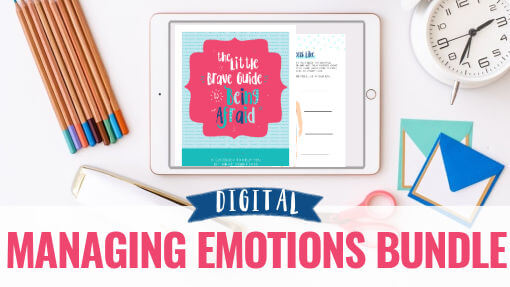
Thinking Errors
Another common reason for feeling stressed and overwhelmed is thinking errors. There are many different types of thinking errors that could come into play. For example, a child may be playing with friends and not get picked first for a team. They may think that this is because no one likes them, that they are not good enough, or that everyone is out to get them. These types of extreme thoughts can lead to a whole lot of internal overwhelm.
Triggers
Another common reason for overwhelm can be triggers. Kids who have experienced trauma or who have processing disorders will often struggle with certain things setting them off into a sense of overwhelm. Triggers could be loud noises, certain phrases, or particular environments or situations. Triggers can be challenging to identify and require a good amount of observation and reflection for both the child and those around them.
Highly Sensitive Children
Some children also fall into the category of being highly sensitive. These kids often struggle with overwhelm on a very regular basis. Situations, conversations, and interactions will easily be internalized which easily overwhelms highly sensitive kids.
Lack of Coping Skills to Calm Down when Feeling Stressed
Another common reason for feeling overwhelmed is a lack of coping skills. This can really cause problems when kids begin to feel frustrated, stressed, angry, sad, or really any other emotion. If a child doesn’t have skills to soothe and calm themselves down, they will not be able to manage or cope with the stress of these emotions and will wind up feeling overwhelmed.
How to Help an Overwhelmed Child
Depending on the cause of the overwhelm, and the behaviors that follow, there are many different ways to help kids cope with feeling stressed and overwhelmed. I tend to have a “throw everything at it” approach to see what works best for the kids I work with.
Here are some different coping skills and ways to help an overwhelmed child:
Calming through Mindfulness Activities for Kids
Mindfulness can be a really important skill for kids. This is especially true for highly sensitive children as well as kids who have a lot of triggers. Becoming more aware of what they are thinking and feeling will help them learn to recognize the patterns that cause overwhelm and eventually begin to break the cycle.
There are many different mindfulness activities that work really well for kids. Here are a few ideas that you can use in a therapy setting, a classroom, or at home.
Coloring Feelings: Having a child color their feelings can be really helpful in learning to recognize emotions. Take a sheet of paper and divide it into 4 sections. Ask the child to name some common emotions that they have trouble with. (Mad, Sad, Frustrated, Jealous, etc.) Then choose a color for each feeling. Write one emotion in each section of your paper and color in. Then, write some words that describe how that feeling feels for them. For example, mad could have words like red face, fast breathing, yelling, hitting.
Deep Breathing: Teaching kids deep breathing techniques is such a great tool for calming down overwhelm and stress. There are many different techniques that work well for kids. Check out this article on how to teach kids to do deep breathing as well as this article on 5 different deep breathing exercises for kids.
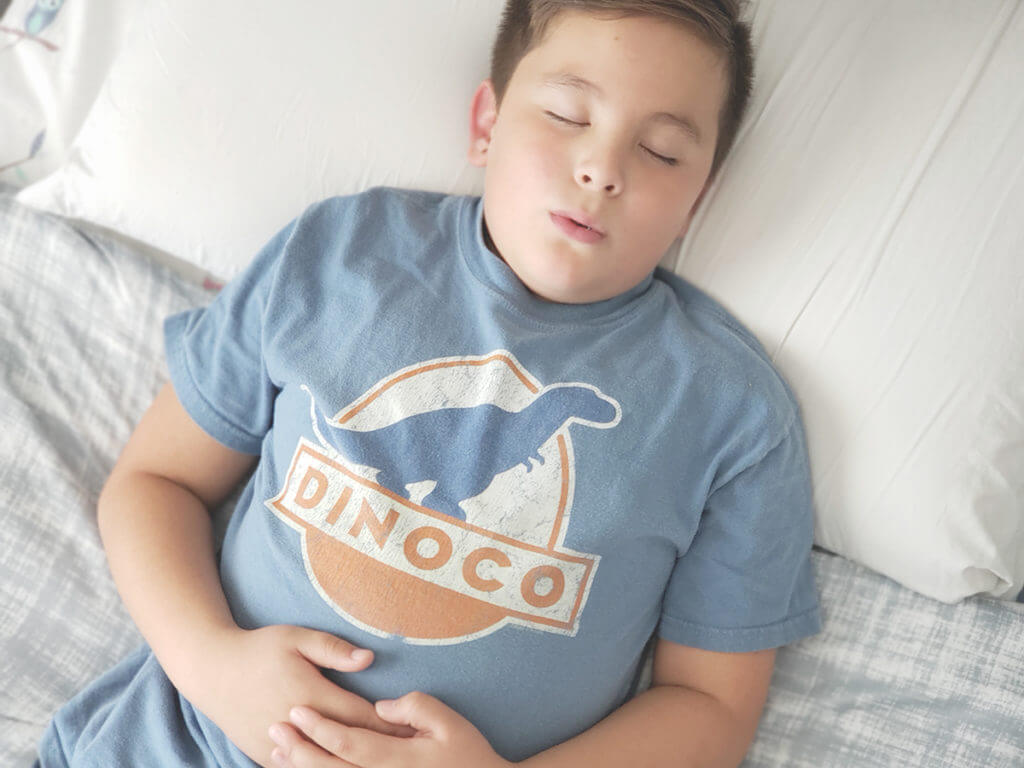
Guided Meditation: Meditation can be another great tool for helping kids calm down when they are feeling overwhelmed. There are many great apps that will guide children through meditation. I love the Calm App, Headspace, and Stop, Breathe & Think.
Using Positive Affirmations: Positive affirmations can be a really fun and helpful tool to address issues like thinking errors. Have your child choose a short phrase that they can repeat to themselves anytime they start feeling overwhelmed. You can also check out this Make Your Own Affirmations Kit for Kids for some fun projects centered around affirmations.
Getting Out Extra Energy with Physical Coping Skills
Some kids begin to feel overwhelmed when they have a build-up of excess energy. (Like when they have been sitting quietly in class for a period of time.) While other kids find that they begin to have a lot of extra energy when they become overwhelmed.
Finding ways that allow kids to expel energy and get back to a calm space can be a very helpful coping skill. Here are a few fun exercises that will help kids manage the extra energy associated with their sense of overwhelm.
Jumping on Ice: This is a really easy and fun skill that helps kids burn off a lot of energy quickly. Bring a few ice cubes outside and let the child jump on them to crush them. This creates a really satisfying noise and works well as a release!
Push, Pull, Relax: This is a great way to deal with extra energy when getting up and moving around is not an option. To do this exercise, sit in a chair. Grab onto the seat of the chair and push down for 10 seconds. Then, pull up on the seat of the chair for 10 seconds. Finally, let your arms hang loosely at the sides for 10 seconds.
Big Movements: Utilizing big, whole-body movements can also be really calming for some kids. Movements like Jumping Jacks, Push-Ups, and Running or Skipping work well.
Calming Down through Distraction
Another great tool for calming overwhelm can be distraction based coping skills. It is important to note that using distraction is not a means of ignoring the problem, but rather a way of calming down enough that the problem can be faced.
Scavenger Hunts: Doing a 5 senses scavenger hunt or an ABC scavenger hunt can be a great way to get the mind focused on something other than what is causing the overwhelm. The Calm Down Card Deck has instructions for both of these and is a great tool to use at home, on the go, or in the classroom.
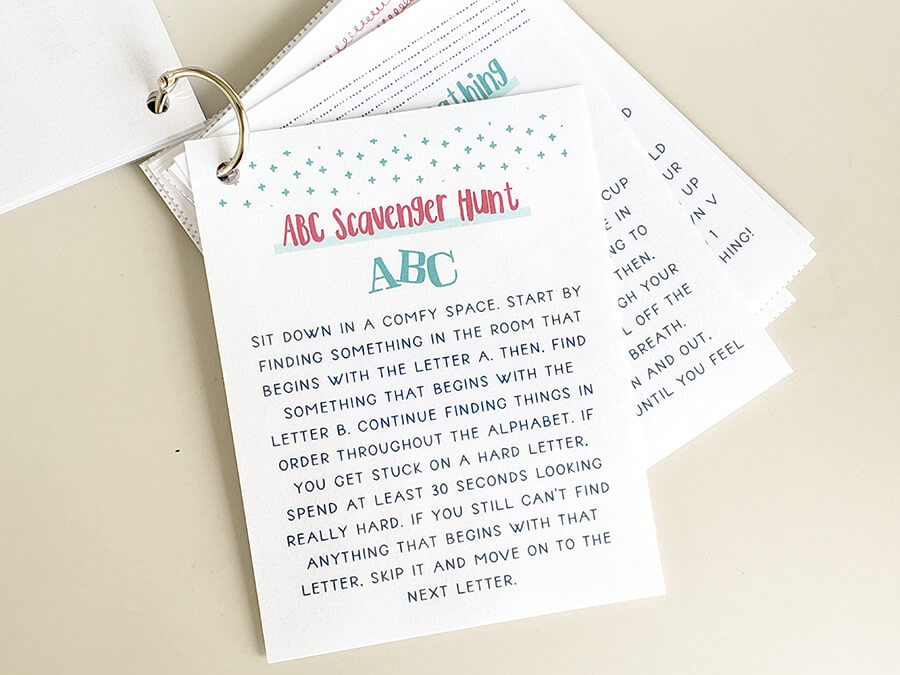
Play a Game: Engaging in a fun and easy game is another great distraction tool. Games like Uno, SkipBo, and Crazy 8’s are all good options. They allow kids to focus on something fun while also allowing space to process what is going on with their partner if needed.
Calming Down by Using Sensory Coping Skills
For some kids, sensory tools can be an important part of their calm down strategy. There are many different options out there but here are a few good ones:
Weighted Blankets: Weighted blankets are a great option for kids who need physical pressure to feel calm. Lying or sitting with a weighted blanket can feel like they are getting a big hug which can be very soothing. Make sure that you use a blanket with the correct weight (it is depending on the child’s weight.) I really like this brand of weighted blanket because it has a removable washable cover!
Playdough/Slime: Playing with playdough or slime is another great sensory experience that can help kids focus their energy and calm down.
Chewing Gum or Eating Something Crunchy: For some kids, utilizing oral stimulation is an important part of their calming strategy. Foods like carrots, rice cakes, or crackers can provide the crunch and texture that helps soothe.
Calming Down through Emotional Processing
Another great coping tool is using skills that help kids do some emotional processing. This works well for slightly older kids as well as for kids who are more in tune with their feelings and able to name and talk about what they are thinking and feeling.
Journaling and/or Drawing: Having a child spend some time writing or drawing about what they are feeling can help them better understand what is going on inside and begin to feel less overwhelmed.
Emotional Check-In: There are lots of different ways to do emotional check-ins. You can simply do a thumbs up, thumbs down, or thumbs sideways. A feelings chart or feelings thermometer is also a great tool. You can also simply ask something like, “how are you feeling right now?”
Helping Kids Who are Overwhelmed
As you can see, there are many different ways to help an overwhelmed child. The first step is to notice the behaviors that signal that the child is feeling overwhelmed. Next, you will want to identify what is causing the overwhelm. And finally, you will want to experiment with different coping skills to find ones that work well for the child.
